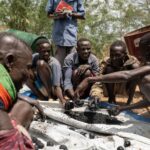Donor governments have been called upon to increase Africa’s climate funding geared towards combating the effects of climate change.
Director for Africa at The ONE Campaign, Serah Makka said that Africa receives a small amount of global climate finance compared to other regions despite being vulnerable to effects of climate change.
According to the group, the annual cost of the continent’s climate adaptation by 2050 is Ksh 7.2 trillion yet it only receives Ksh 2.8 trillion and only 3pc of global investment in clean energy in as much as the region has the world’s highest potential for renewable energy.
She said Africa’s potential isn’t dependent on handouts or second-hand solutions from rich nations but by removing the barriers.
“African countries possess the tools, talent and renewable resources to fuel their own growth and be at the vanguard of efforts to tackle climate change, poverty and inequality everywhere. But they are being blocked by a broken global financial system that denies them access to the affordable finance needed to unleash this potential,” she said.
She further called upon the World Bank shareholders and donor governments to commit to tripling grants and loans which could deliver an additional Ksh 174.8 trillion in finance by 2030, deliver on their commitment to double adaptation finance and commit to a framework for the Global Goal on Adaptation that is needs-based.
According to Josefa Leonel Correia Sacko, Africa Union Commissioner in charge of Agriculture, Blue Economy and Sustainable Environment, Africa accounts for the smallest share of global greenhouse gas emissions at 3.8pc compared to China, United States, and European Union which have 23, 19 and 13pc respectively.
“Development partners need to also honor their promise made in the Paris agreement of investing Ksh 14.5 trillion in mitigating Africa’s climate challenges. We have not seen the investment yet,” she said.




